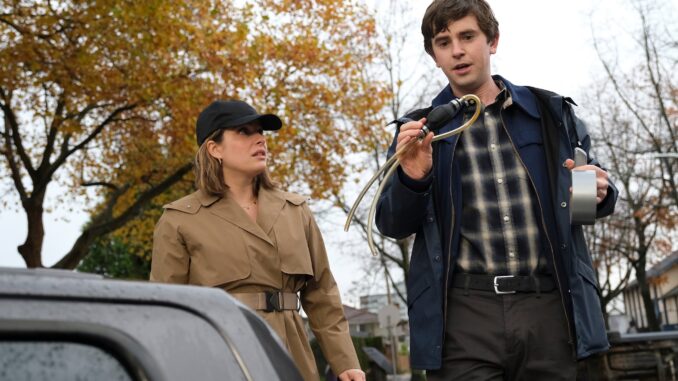
Freddie Highmore may well be trying to make amends. After spending five seasons as Psycho killer Norman Bates on Bates Motel, the British actor is now saving lives as Dr. Shaun Murphy on ABC’s runaway hit The Good Doctor. The medical drama from House creator David Shore is also going out of its way to challenge stigmas around people with autism, as Shaun takes a job as a surgical resident over the protests of higher-ups who are skeptical of his condition, and how it will affect his work. For Highmore, getting to grips with the challenges and opportunities of Shaun’s world was irresistible.
Exactly. Part of the appeal of procedurals, in general, is that there’s a continuity and consistency week after week; that you can come to the show and know what you’re going to get. But I feel like my character, Shaun, breaks that mold a bit because he’s changed so much over the course of this first season. If you skip out a few episodes, I think you miss out on that journey.

But that’s why he’s such an exciting character to play because most networks would have wanted him to stay the same doctor week in, week out. To limit the amount of progression he would be allowed to do. It’s exciting to plot out—and obviously, it’s there in David Shore’s brilliant writing—how each episode affects and changes him.
And it’s not just Shaun; it’s the way others are changed by him, and how he makes the hospital a better place. Hopefully, Dr. Melendez [Nicholas Gonzalez] is getting a little less Dr. Melendez-y the more time he spends with Shaun.
Have you spent much time comparing and contrasting Shaun with Norman Bates, who you played in Bates Motel?

Shaun is very much the opposite [laughs]. Although I could discuss forever the ways in which Norman wasn’t really an antihero; he had his flaws, but Bates was actually this beautiful love story between a lovely young guy and his mom!
But I think what’s been refreshing to people with The Good Doctor is it’s almost a reversal of the tendency to sit down and watch a dark show. It’s comforting to come home at the end of a hard day and watch an episode of The Good Doctor because it’s not hard-hitting. With Bates, I think you’d probably want to balance watching it with watching something that doesn’t make you feel dark and scared as you go to bed.
You had three days to switch gears.
Three days, yeah, between finishing Bates and starting The Good Doctor. It wasn’t really the plan. If you’d have asked me before I got the script, after the relief of finishing a season that took so much from everyone involved, I think I’d have said I was excited about the world of possibility that opens up from not being part of a television show.

But then this script came through, and once I’d gotten over the fact that it could be possible to find such an interesting character three days after finishing with another, I managed to reconcile that I was just so lucky fate had intervened. Saying yes was easy, then, and I was off, back to Vancouver. It felt like it wasn’t just an interesting character, but an important show with an important story to tell.
To what extent TV shows have the power to change the world is always debatable, and ultimately it is just a television show. But I like to think it’s important to portray characters like Shaun on TV in the way this show is doing because I don’t think it’s been done in quite this way before.
What was the power of this character, in your mind?
I think that Shaun, hopefully, speaks not just to people with autism, but to anyone who has felt somewhat different or marginalized by society, or that they haven’t had their fair shot and their chance to prove themselves for whatever reason.

Everyone on the spectrum is different too, and even people with autism aren’t necessarily going to identify with the exact experience Shaun goes through. It’s just the idea of him showing up in that workplace, in the very first episode, and the conversations that are going on about whether they should have someone like Shaun working at the hospital. You’d think society has moved on, but I think the reality is very different.
You’re joining the writers’ room on Season 2 and will be directing an episode. You did that on Bates Motel also. Did you entertain that idea in Season 1, or did you prefer to bed-in with the character first?
It was a discussion that I had, and was very open with David about, from the beginning. I so enjoyed that level of involvement with Bates Motel of getting to contribute beyond acting. When I work on something it becomes all-consuming for me, and so as time went on with Bates, it just seemed odd not to want to be involved in telling those stories. You put so much in for four or five months that it felt disingenuous to go off on holiday and be like, “See you day one and I’ll see what you’ve come up with for Norman.”
